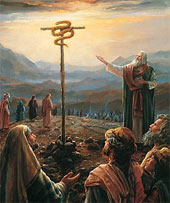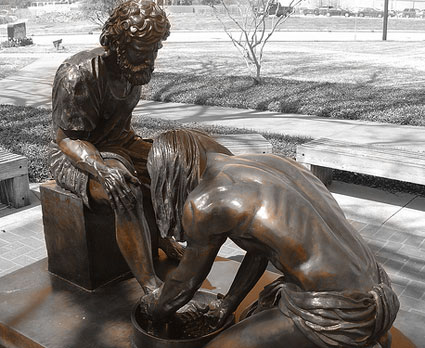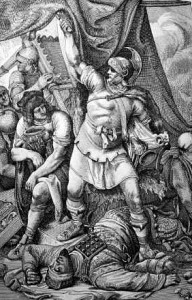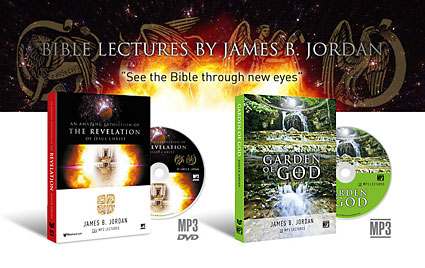Aug
18
2009
How were the gentiles related to Passover?
By watching it, and putting faith in it.
 In order for a stranger to eat Passover, he had to circumcise himself and his household (Ex. 12:45-49). If he did so, he became “like a native of the land” (v. 48). We are so accustomed to connecting Passover with the Lord’s Supper that it seems strange to consider that perhaps Passover was only for the priestly people, but such was the case. Converted gentiles were not to eat of it unless they were circumcised, and thereby were incorporated into the seed line of Abraham. Did this exclude them from salvation? No, it only excluded them from priestly duties. Did it make them second class citizens? Only in the eyes of the Pharisees. Biblically speaking, their downstream cultural labors in Havilah were just as important as Israel’s sanctuary task. After all, if everyone had become an Israelite, then who would mine the gold of Havilah? Who would bring it to the sanctuary? Israel had its task, and the converted nations had theirs.
In order for a stranger to eat Passover, he had to circumcise himself and his household (Ex. 12:45-49). If he did so, he became “like a native of the land” (v. 48). We are so accustomed to connecting Passover with the Lord’s Supper that it seems strange to consider that perhaps Passover was only for the priestly people, but such was the case. Converted gentiles were not to eat of it unless they were circumcised, and thereby were incorporated into the seed line of Abraham. Did this exclude them from salvation? No, it only excluded them from priestly duties. Did it make them second class citizens? Only in the eyes of the Pharisees. Biblically speaking, their downstream cultural labors in Havilah were just as important as Israel’s sanctuary task. After all, if everyone had become an Israelite, then who would mine the gold of Havilah? Who would bring it to the sanctuary? Israel had its task, and the converted nations had theirs.
Continue reading
2 comments | tags: Abraham, Circumcision, James Jordan, Passover, Pharisees | posted in Biblical Theology, Quotes
Aug
17
2009
or Lord of the Flies

Isaiah 66 pictures hypocritical worship as the Altar of the Abyss (See that series here).
This is just a quick overview. Most of it does seem to fit, but I’m sure there’s plenty more work to do here…
Continue reading
Comments Off | tags: Atonement, Feasts, Isaiah, Numbers 5, Tabernacle | posted in Biblical Theology
Aug
16
2009
From Peter Leithart’s blog today, supporting a preterist interpretation of Romans 9-11:
Continue reading
Comments Off | tags: AD70, Peter Leithart | posted in The Last Days
Aug
16
2009
Roderick Edwards on the accusation that those who reject hyperpreterism must rely on creeds for support:
“…the more I look at it, though hyperpreterists try to make it look like eschatology is the most “unsettled condition” of the Church; eschatology is actually probably the most unified doctrine within the Church.
Continue reading
Comments Off | posted in Against Hyperpreterism, Quotes, The Last Days
Aug
16
2009

How serious is it to say to a regenerate person: “You are not permitted to be a member of this church”?
If you haven’t heard John Piper’s sermons on the importance of baptism and church membership last year, do yourself a favour.
Frank Turk does have an issue with one point, however, which I repost here with his permission:
. . . . . . . . . . . . . . . . . . . . . . . . . .
Dr. Piper opens up the can of worms at his church again by beginning a series on baptism and church membership. The long-time readers of this blog know for a fact that this topic is near to me and dear to me — because it’s one of the topics I have blogged about most often. And in that, I think I am more a Baptist for it today than I was 3 years ago.
Continue reading
6 comments | tags: Baptism, Frank Turk, John Piper | posted in Christian Life, Quotes
Aug
14
2009

or Filling Up That Which is Lacking
After reading about the Bible’s use of robes as symbols of office (see The Dominion Trap by James B. Jordan), Tim Mitchell commented:
In Bible study we’ve been looking at John, so a few weeks ago was John 13. My Bible translated v.4-5 as “So he got up from the table, took off his robe, wrapped a towel around his waist, and poured water into a basin. Then he began to wash the disciples’ feel, drying them with the towel he had around him.”
So that recalled for me the couple of pages on robe imagery, and it seems to foreshadow what Jesus will do later on very well: He is willing to take off his authority and righteousness, and take on the dirt of our sin.
But then I got a bit unsure, since Jesus then goes on to say “you ought to wash each others’ feet” in v.14 and “Do as I have done to you” in v.15. So if the symbolism applies, how are we also supposed to take other peoples’ sin on us as Jesus did?
Firstly, what a great question. Many New Testament passages become so familiar that we often lose the ability to really think about their ramifications.
The structure of the Last Supper puts this action of Jesus at Atonement, the Laver (Day 6). Jesus is liturgically pre-enacting His role as High Priest. The Adam removed his glorious robes and wore linen for the Day of Covering. Jesus left this in the tomb with our sin on it. But that is not all the High Priest did. He approached the Most Holy twice.
Continue reading
Comments Off | tags: AD70, Against Hyperpreterism, Ahasuerus, Atonement, Daniel, Esther, Hebrews, High Priest, Holy Place, Joseph, Last Supper, Liturgy, Totus Christus | posted in Biblical Theology, Christian Life, Totus Christus
Aug
13
2009

My Hebrew teacher was reading a Kabbalistic text and noted that it was the only place where he had seen an interpretation of Isaiah 6:3 that agreed with his own translation. We usually get something like this (NASB):
“Holy, Holy, Holy, is the LORD of hosts, The whole earth is full of His glory.”
The Hebrew is actually like this, (from Young’s translation):
“Holy, Holy, Holy, [is] Jehovah of Hosts, The fulness of all the earth [is] His glory.”
Continue reading
1 comment | tags: Bible Matrix, Feasts, Isaiah, Numbers 5, offspring, oikoumene, Postmillennialism | posted in Biblical Theology
Aug
12
2009

or The Devil’s Marshmallow
or Dominion by Stealth
NOTE: THIS POST HAS BEEN REMIXED AND INCLUDED IN GOD’S KITCHEN.
I listened to a White Horse Inn podcast recently, titled Boredom and Entertainment.
Compared with an action-packed movie, most people would probably characterise the ministry of the word and sacrament as “boring.” So in order to reach out, should churches make their services more entertaining? Joining the panel for this discussion is Richard Winter, author of Still Bored in a Culture of Entertainment…
Continue reading
2 comments | tags: Bible Matrix, Culture, Film, Postmillennialism | posted in Biblical Theology, Christian Life, Creation
Aug
11
2009

There’s a great deal of confusion concerning the place of modern Jews in God’s economy. This stems from a misunderstanding of what occurred in the first century, which is difficult to interpret if we ignore previous occurrences of the same pattern. Dispensationalists cherrypick Old Testament verses and rip them out of their historical contexts to maintain that there is a separate plan for the Jews. But even many Conservatives who understand rightly that the Old Covenant is in fact over, believe that God is still joining Jew and Gentile into one body.
Titus steps over the High Priest into the Most Holy Place.
Continue reading
Comments Off | tags: Abraham, James Jordan, oikoumene | posted in Biblical Theology, Quotes, The Last Days
Aug
11
2009
 David Chilton’s The Days of Vengeance gets downloaded from my site over 30 times a day (add that up for three years!). It’s a great commentary, but Jordan’s lectures use the Bible instead of Josephus to interpret Revelation. Chilton was peeping through the keyhole. Jordan throws open the door. These are cutting edge and, I believe, indispensable for anyone with an interest in preterism.
David Chilton’s The Days of Vengeance gets downloaded from my site over 30 times a day (add that up for three years!). It’s a great commentary, but Jordan’s lectures use the Bible instead of Josephus to interpret Revelation. Chilton was peeping through the keyhole. Jordan throws open the door. These are cutting edge and, I believe, indispensable for anyone with an interest in preterism.
Available here, or from www.wordmp3.com
Days of Vengeance is on this page (near the bottom).
2 comments | tags: James Jordan, Revelation | posted in Biblical Theology, The Last Days
In order for a stranger to eat Passover, he had to circumcise himself and his household (Ex. 12:45-49). If he did so, he became “like a native of the land” (v. 48). We are so accustomed to connecting Passover with the Lord’s Supper that it seems strange to consider that perhaps Passover was only for the priestly people, but such was the case. Converted gentiles were not to eat of it unless they were circumcised, and thereby were incorporated into the seed line of Abraham. Did this exclude them from salvation? No, it only excluded them from priestly duties. Did it make them second class citizens? Only in the eyes of the Pharisees. Biblically speaking, their downstream cultural labors in Havilah were just as important as Israel’s sanctuary task. After all, if everyone had become an Israelite, then who would mine the gold of Havilah? Who would bring it to the sanctuary? Israel had its task, and the converted nations had theirs.
































